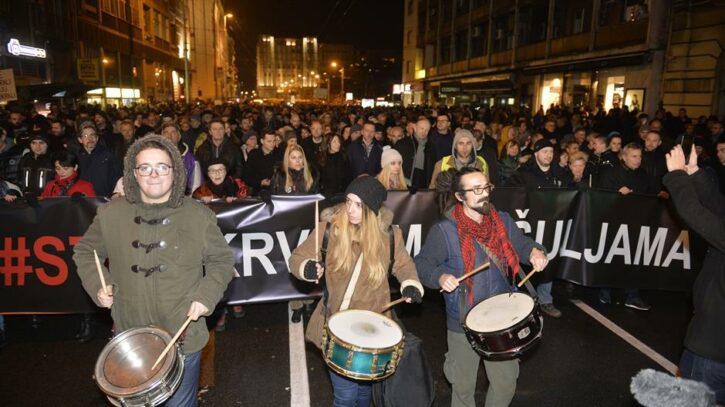
Thousands gathered in Belgrade on Saturday evening to protest against violence in society, displaying the slogan “Stop to bloody shirts.” The protest came after an opposition leader was brutally beaten last month.
The protest saw no incidents and although some opposition leaders called upon citizens to join the protest, no political party symbols could be seen.
The beating of opposition politician Borko Stefanovic in the central Serbian town of Krusevac in November inspired calls for the protest. He and two other opposition activists were brutally beaten, with Stefanovic suffering a head injury, and later showing to the public his blood-soaked shirt, which gave the Saturday protest its name.
Protesters walked the streets of Serbia’s capital chanting slogans targeting the ruling Serbian Progressive Party (SNS), including “Out with you” and “you will not get away with it.”
The crowd started the walk in front of the Parliament building, and continued toward the building of Serbia’s public broadcaster, chanting and blowing whistles.
They carried a large sign, saying “Always a whistle, never again a gun”, “For the rule of law and justice”, “Neo-nazi Progressives” (aimed at the SNS), “Bloody gang,” “Why are you silent Europe”, “Open the media for the head of the opposition.”
The latter chants refer to the dissatisfaction of Serbia’s opposition politicians with how the broadcasters with national frequency are covering certain topics and with how little or no airtime they receive in the programme.
Lawmaker Ana Stevanovic told N1 on Sunday that the protest was a call against verbal, physical and psychological violence.
The covers of Serbian newspapers show that media has mostly ignored the protest, she said, asking what it is that the government and editors are trying to hide?
“We gathered to fight against violence, violence that takes place in the parliament against opposition lawmakers, violence that takes place in society, and violence against the leader of “Serbia’s Left”, Borko Stefanovic,” she said.
She estimated that there were tens of thousands of citizens at the protest and media ignored it nevertheless, she said, explaining that most print media in the country are connected to those in power.
“That is a practice in Serbia for decades,” she said.
This is why she thinks that the opposition must talk to the citizens directly and more than currently, she added.




